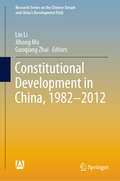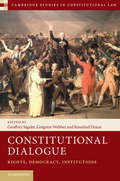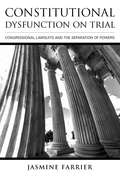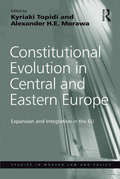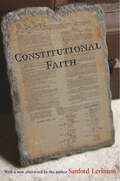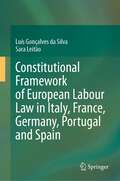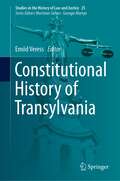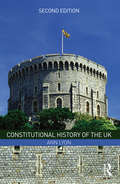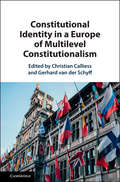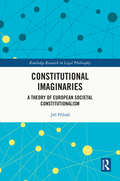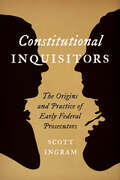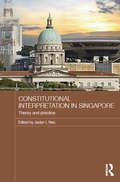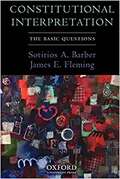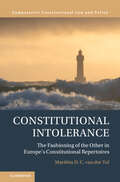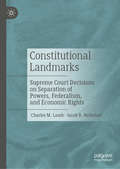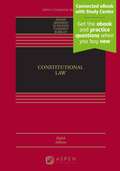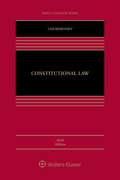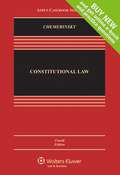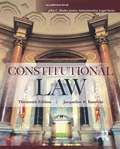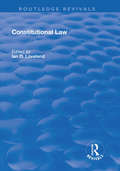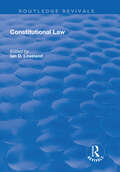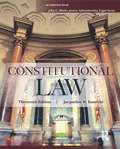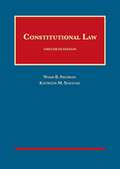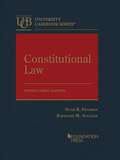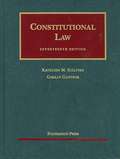- Table View
- List View
Constitutional Development in China, 1982-2012 (Research Series on the Chinese Dream and China’s Development Path)
by Lin Li Jihong Mo Guoqiang ZhaiThis volume presents an overview of the evolution of the current Chinese Constitution (1982) and the characteristics of constitutional studies since 1978. Readers are introduced to the basic principles of constitutional system in China and gain insights into the real state of Chinese law, allowing them to form their own opinions. It will also aid commercial communications with Chinese legal professionals as well as enterprises. The book covers a number of topics, including the history of constitutional communication between Chinese constitutionalists and the International Association of Constitutional Law since 1981, the most important academic contributions to international conferences concerning constitutional law by Chinese constitutionalists, the main characteristics of the current Chinese Constitution in the field of constitutional studies in China, the key issues of constitutional practice and implementation in China, the challenges of running the fundamental political system of the People’s Representative Congress and the characteristics of rule of law specific to China.
Constitutional Dialogue: Rights, Democracy, Institutions (Cambridge Studies in Constitutional Law #21)
by Grégoire Webber Rosalind Dixon Geoffrey SigaletThe metaphor of 'dialogue' has been put to different descriptive and evaluative uses by constitutional and political theorists studying interactions between institutions concerning rights. It has also featured prominently in the opinions of courts and the rhetoric and deliberations of legislators. This volume brings together many of the world's leading constitutional and political theorists to debate the nature and merits of constitutional dialogues between the judicial, legislative, and executive branches. Constitutional Dialogue explores dialogue's democratic significance, examines its relevance to the functioning and design of constitutional institutions, and covers constitutional dialogues from an international and transnational perspective.
Constitutional Dysfunction on Trial: Congressional Lawsuits and the Separation of Powers
by Jasmine FarrierIn an original assessment of all three branches, Jasmine Farrier reveals a new way in which the American federal system is broken. Turning away from the partisan narratives of everyday politics, Constitutional Dysfunction on Trial diagnoses the deeper and bipartisan nature of imbalance of power that undermines public deliberation and accountability, especially on war powers. By focusing on the lawsuits brought by Congressional members that challenge presidential unilateralism, Farrier provides a new diagnostic lens on the permanent institutional problems that have undermined the separation of powers system in the last five decades, across a diverse array of partisan and policy landscapes.As each chapter demonstrates, member lawsuits are an outlet for frustrated members of both parties who cannot get their House and Senate colleagues to confront overweening presidential action through normal legislative processes. But these lawsuits often backfire – leaving Congress as an institution even more disadvantaged. Jasmine Farrier argues these suits are more symptoms of constitutional dysfunction than the cure. Constitutional Dysfunction on Trial shows federal judges will not and cannot restore the separation of powers system alone. Fifty years of congressional atrophy cannot be reversed in court.
Constitutional Evolution in Central and Eastern Europe: Expansion and Integration in the EU (Studies in Modern Law and Policy)
by Alexander H.E. MorawaThis book examines EU enlargement by studying how domestic constitutional evolution in the new member states contributes to European integration. In contrast to the usual top-down analytical pattern, it reverses the paradigm by looking at constitutional developments and dynamics from the bottom-up, studying how domestic constitutional evolution contributes to European integration. The authors analyze constitutional trends from the perspective of 'new Member States' as policy-makers and not strictly as policy-takers. The issue of conditionality is also explored in a discussion of the extent to which pre-2004 and 2007 conditionality has had lasting effects at the level of constitutionalization of different areas and norms and if so, of what kind. The exploration of Europeanization effects in recent Member States substantiates and demonstrates how enlargement has been an important driving-force for the effective export of EU legal rules in this region. The book utilizes a comparative approach to highlight the merits and obstacles created by the growing diversity in the constitutional rules and patterns of the new Member States. It also contains a section that places the CEE constitutionalizing map in a broader comparative European and global context, establishing links with similar transitional regimes in the continent and elsewhere.
Constitutional Faith
by Sanford LevinsonThis book examines the "constitutional faith" that has, since 1788, been a central component of American "civil religion." By taking seriously the parallel between wholehearted acceptance of the Constitution and religious faith, Sanford Levinson opens up a host of intriguing questions about what it means to be American. While some view the Constitution as the central component of an American religion that serves to unite the social order, Levinson maintains that its sacred role can result in conflict, fragmentation, and even war. To Levinson, the Constitution's value lies in the realm of the discourse it sustains: a uniquely American form of political rhetoric that allows citizens to grapple with every important public issue imaginable. In a new afterword, Levinson looks at the deepening of constitutional worship and attributes the current widespread frustrations with the government to the static nature of the Constitution.
Constitutional Framework of European Labour Law in Italy, France, Germany, Portugal and Spain
by Luís Gonçalves da Silva Sara LeitãoThe challenges that labour law currently faces are well known. The emergence of new forms of work and the growing importance of technology in the age of the Fourth Industrial Revolution are important tests of the resilience of this field of law and its function: regulating the labour market. Therefore, it is becoming increasingly important to examine the fundamentals of labour law, especially how subordinate labour is addressed in various countries’ constitutions, in order to focus the analysis of the new phenomena affecting labour relations on their fundamental frameworks.In this context, this book puts forward an overarching framework that reflects how the Italian, German, French, Portuguese, and Spanish constitutions view labour in terms of both collective and individual relations – particularly the right to collective bargaining, the right to strikes and lock-outs, job security, and the right to remuneration – without losing sight of each Constitution's historical and political context.The aim of this book is therefore to provide an overview of the labour law frameworks in the constitutions of these legal systems and to show, by means of practical examples, how the law concretely implements them. Accordingly, it provides notes on the legal treatment of the topics analysed, serving as a practical guide for the study of these matters in the respective jurisdictions.This book will be of interest to all students and scholars of labour law looking for an overview of the topics covered in all five jurisdictions.
Constitutional History of Transylvania (Studies in the History of Law and Justice #25)
by Emőd VeressThis book examines the constitutional history of Transylvania, a region of Central Europe that has experienced a compelling series of historical events and been governed by a variety of ancient, medieval, and modern entities, as well as its own peoples, who from time to time have jointly or separately exercised their right to self-governance. The book’s main goal is to provide, for the first time in English, a comprehensive source for those interested in the variety of states, constitutional and public legal orders which have succeeded one another during Transylvania’s tumultuous history. It serves to underline the region’s uniqueness as a space where (for better or worse) several nationalities, multiple religions and varied cultures have had to find a way to get along, under the pressures of external state and constitutional orders. It seeks to show both the positive and the negative solutions found, which advanced or hindered this goal of organised coexistence.
Constitutional History of the UK
by Ann LyonAn appreciation of the development and evolution of the United Kingdom constitution is vital in order to understand the existing nature of the constitution, proposals for reform and the many complex challenges it faces. Ann Lyon presents a vivid overview of fourteen hundred years of English legal history taking us on a rich journey from a feudal society to the fractured Union of the present day. Drawing on key constitutional themes, Constitutional History of the United Kingdom provides insight and context to modern constitutional problems. This second edition has been revised and updated to bring coverage up to the present day, including parliamentary reform; the Scottish referendum on independence and further drives for enhanced devolution; the effect of EU membership on the UK Constitution; and the impact of the European Convention on Human Rights and the Human Rights Act 1998. Constitutional History of the United Kingdom offers an accessible and highly valuable overview for students with little or no prior knowledge of British history.
Constitutional Identity in a Europe of Multilevel Constitutionalism
by Christian Calliess Schyff Gerhard Van DerThe constitutional identity of the Member States is a topic of increasing importance in understanding the interaction between the EU and its Member States. This is because the EU is enjoined to respect the constitutional identities of its Member States in accordance with Article 4(2) TEU. There is also a trend among Member States to articulate their constitutional identities, in particular in relation to European integration. In this regard, this volume fills a need in scholarship by presenting critical analyses of the constitutional identities of selected Member States. Leading and well-placed experts contribute country studies on a range of states, which are compared using a framework that can be applied to other Member States as well. The analyses and comparison of Member States' constitutional identities take place in the context of the EU's multilevel architecture.
Constitutional Imaginaries: A Theory of European Societal Constitutionalism (Routledge Research in Legal Philosophy)
by Jiří PřibáňThis book offers a social theoretical analysis of imaginaries as constituent social forces of positive law and politics. Constitutional imaginaries invite constitutional and political theorists, philosophers and sociologists to rethink the concept of constitution as the normative legal limitation and control of political power. They show that political constitutions include societal forces impossible to contain by legal norms and political institutions. The constitution of society as one polity defined by the unity of topos-ethnos-nomos, that is the unity of territory, people and their laws, informed the rise of modern nations and nationalisms as much as constitutional democratic statehood and its liberal and republican regimes. However, the imaginary of polity as one nation living on a given territory under the constitutional rule of law is challenged by the process of European integration and its imaginaries informed by transnational legal and societal pluralism, administrative governance, economic performativity and democratically mobilised polity. This book discusses the sociology of imagined communities and the philosophy of modern social imaginaries in the context of transnational European constitutionalism and its recent theories, most notably the theory of societal constitutions. It offers a new approach to the legal constitutions as societal power formations evolving at national, European and global levels. The book will be of interest to scholars and students interested in constitutional and European law theory and philosophy as much as interdisciplinary and socio-legal studies of transnational law and society.
Constitutional Interpretation in Singapore: Theory and Practice (Routledge Law in Asia)
by Jaclyn L NeoAt the heart of constitutional interpretation is the struggle between, on the one hand, fidelity to founding meanings, and, on the other hand, creative interpretation to suit the context and needs of an evolving society. This book considers the recent growth of constitutional cases in Singapore in the last ten years. It examines the underpinnings of Singapore’s constitutional system, explores how Singapore courts have dealt with issues related to rights and power, and sets developments in Singapore in the wider context of new thinking and constitutional developments worldwide. It argues that Singapore is witnessing a shift in legal and political culture as both judges and citizens display an increasing willingness to engage with constitutional ideas and norms.
Constitutional Interpretation: The Basic Questions
by Sotirios A. Barber James E. FlemingRonald Dworkin famously argued that fidelity in interpreting the Constitution as written calls for a fusion of constitutional law and moral philosophy. Barber and Fleming take up that call, arguing for a philosophic approach to constitutional interpretation. In doing so, they systematically critique the competing approaches - textualism, consensualism, originalism, structuralism, doctrinalism, minimalism, and pragmatism - that aim and claim to avoid a philosophic approach. Constitutional Interpretation: The Basic Questions illustrates that these approaches cannot avoid philosophic reflection and choice in interpreting the Constitution. <p><p> Barber and Fleming contend that fidelity in constitutional interpretation requires a fusion of philosophic and other approaches, properly understood. Within such a fusion, interpreters would begin to think of text, consensus, intentions, structures, and doctrines not as alternatives to, but as sites of philosophic reflection about the best understanding of our constitutional commitments. Constitutional Interpretation: The Basic Questions, examines the fundamental inquiries that arise in interpreting constitutional law. In doing so, the authors survey the controversial and intriguing questions that have stirred constitutional debate in the United States for over two centuries, such as: how and for what ends should governmental institutions and powers be arranged; what does the Constitution mean under general circumstances and how should it be interpreted during concrete controversies; and finally how do we decide what our constitution means and who ultimately decides its meaning.
Constitutional Intolerance: The Fashioning of the Other in Europe's Constitutional Repertoires (Comparative Constitutional Law and Policy)
by Mariëtta D. van der TolConstitutional Intolerance offers a deeper reflection on intolerance in politics and society today, explaining why minorities face the contestation of their public visibility, and how the law could protect them. Van der Tol refers to historical practices of toleration, distilling from it the category of 'the other' to the political community, whose presence, representation, and visibility is not self-evident and is often subject to regulation. The book considers 'the other' in the context of modern constitutions, with reference to (ethno)religious, ethnic, and sexual groups. Theoretical chapters engage questions about the time and temporality of otherness, and their ambivalent relationship with (public) space. It offers examples from across the liberal-illiberal divide: France, the Netherlands, Hungary, and Poland. It highlights that vulnerability towards intolerance is inscribed in the structures of the law, and is not merely inherent to either liberalism or illiberalism, as is often inferred.
Constitutional Landmarks: Supreme Court Decisions on Separation of Powers, Federalism, and Economic Rights
by Charles M. Lamb Jacob R. NeiheiselThis book examines leading Supreme Court decisions involving the powers of the Court, the president, and Congress, as well as cases addressing American federalism and Americans’ economic rights. By analyzing both the Court’s opinions and voting patterns from 1791 through 2018, this volume presents an overview of the role of the Supreme Court in the legal and political system of the United States throughout its entire history, regularly relying on Robert McCloskey’s theory of the nation’s three major constitutional eras and the Supreme Court Database in its organizational approach. Over 100 of the Supreme Court's most significant rulings, old and new, are covered and clarified in this volume to provide an objective, reliable, and valuable resource for students, academics, legal professionals, and the general public alike.
Constitutional Law (Aspen Casebook Series)
by Cass R. Sunstein Geoffrey R. Stone Pamela S. Karlan Mark V. Tushnet Louis Michael SeidmanAdhering to the multi-disciplinary and scholarly approach of its predecessors, the eighth edition of Constitutional Law guides students through all facets of constitutional law. Constitutional Law explores traditional constitutional doctrine through the lens of varying critical and social perspectives informed by political theory, philosophy, sociology, ethics, history, and economics. This comprehensive approach paired with carefully edited cases provides instructors with rich material for classroom discussion. Logically organized for a two-semester course, the first part of Constitutional Law tackles issues concerning separation of powers and federalism while the second part addresses all facets of individual rights and liberties. Constitutional Law also provides thoughtfully selected content on the First Amendment to give students a well-rounded understanding of religion and free speech issues. <p><p> Key Features: <p><p> The text’s attention to policy, including discussion of competing critical and social perspectives. <p>A multi-disciplinary approach that draws on political theory, philosophy, sociology, ethics, history, and economics. <p>Thoughtful editing, including both lightly and more tightly-edited cases that balances close textual analysis with comprehensive converge of important opinions and pivotal cases. <p>Streamlined treatment of First Amendment law, so that it efficiently provides the necessary fundamentals in free speech and religious liberties jurisprudence.
Constitutional Law (Aspen Casebook)
by Erwin ChemerinskyBuy a new version of this Connected Casebook and receive access to the online e-book, practice questions from your favorite study aids, and an outline tool on CasebookConnect, the all in one learning solution for law school students. CasebookConnect offers you what you need most to be successful in your law school classes— portability, meaningful feedback, and greater efficiency. A leading text by a prominent scholar, Constitutional Law is known for its concise, yet comprehensive presentation. Professor Chemerinsky’s distinctive approach for the Sixth Edition presents the law solely through case excerpts and his own essays. With the author’s context and background information, the law becomes more readily understood. A flexible organization accommodates a variety of course structures; no chapter assumes that students have read preceding material. New to the Sixth Edition: New cases decided since the Fifth Edition, including those on partisan gerrymandering, the travel ban, state action, freedom of speech, and the religion clauses Significant reorganizations of some of the chapters (including chapters on federal limits on state power and the religion clauses) Professors and students will benefit from: Renowned authorship Concise, yet comprehensive presentation Distinctive approach presents the law solely through case excerpts and author-written essays Straightforward, accessible writing style that provides context and background information for greater understanding Flexible organization—no chapter assumes that students have read the rest Cases and materials have been edited to be as ideologically neutral as possible Teaching materials include: Teacher’s Manual
Constitutional Law (Fourth Edition ) (Aspen Casebook Series)
by Erwin ChemerinskyA leading text by a prominent scholar, Constitutional Law is known for its concise, yet comprehensive presentation. Professor Chemerinsky's distinctive approach presents the law solely through case excerpts and his own essays. With the author s context and background information, the law becomes more readily understood. A flexible organization accommodates a variety of course structures; no chapter assumes that students have read preceding material. The Fourth Edition introduces a streamlined presentation for even greater manageability. Major new cases are reviewed: United States Department of Health and Human Services v. State of Florida (constitutionality of the Affordable Care Act); Arizona v. United States (preemption of Arizona's SB 1070); McDonald v. City of Chicago (application of the Second Amendment to the states); and Citizens United v. Federal Election Commission (First Amendment right of corporations to spend money in elections.)
Constitutional Law (John C. Klotter Justince Administration Legal Series)
by Jacqueline R. KanovitzPresents an up-to-date analysis of critical constitutional issues. Special attention is given to issues of greatest concern to criminal justice personnel - detention, arrest, search and seizure, interrogations and confessions, self-incrimination, due process, and right to counsel. Also includes constitutional aspects of criminal and civil liabilities of justice personnel, and constitutional and civil rights in the workplace.
Constitutional Law (Routledge Revivals)
by Ian D. LovelandThis title was first published in 2000: This volume of essays explores a number of fundamental constitutional law questions in a variety of historical and jurisdictional contexts. The contributions focus on the role to be played by courts and legal principles in the resolution of major political controversies and on the progressive development of constitutional jurisprudence in countries sharing a broadly common law legal tradition. The guiding theme pervading the collection is an attempt to measure the legitimacy of judicial (in-)activism when courts are faced with difficult political choices on matters such as slavery, internment, racism and voting rights and radical economic policies and are also confronted with the requirement to attach concrete meanings to such abstract concepts as the separation of powers and the rule of law.
Constitutional Law (Routledge Revivals)
by Ian D. LovelandThis title was first published in 2000. This volume of essays explores a number of fundamental constitutional law questions in a variety of historical and jurisdictional contexts. The contributions focus on the role to be played by courts and legal principles in the resolution of major political controversies and on the progressive development of constitutional jurisprudence in countries sharing a broadly common law legal tradition. The guiding theme pervading the collection is an attempt to measure the legitimacy of judicial (in-)activism when courts are faced with difficult political choices on matters such as slavery, internment, racism and voting rights and radical economic policies and are also confronted with the requirement to attach concrete meanings to such abstract concepts as the separation of powers and the rule of law.
Constitutional Law (Thirteenth Edition)
by Jacqueline R. KanovitzPresents an up-to-date analysis of critical constitutional issues. Special attention is given to issues of greatest concern to criminal justice personnel _ detention, arrest, search and seizure, interrogations and confessions, self-incrimination, due process, and right to counsel. Also includes constitutional aspects of criminal and civil liabilities of justice personnel, and constitutional and civil rights in the workplace. Part II presents key cases to assist in interpreting the constitutional provisions.
Constitutional Law (University Casebook Series)
by Noah Feldman Kathleen SullivanThis casebook provides a unique combination of clearly structured and lawyerly coverage of the cases with rich historical, theoretical, and philosophical materials that illuminate the development of our constitutional law. The note materials and questions in the casebook make it easy to structure classes and promote lively discussion. And comparative examples from the constitutional law of other nations are provided throughout. <p><p> The Twentieth Edition is an updated version of this classic casebook, adding new materials on the Supreme Court’s most recent decisions on the First Amendment, Equal Protection, Substantive Due Process, Separation of Powers, and Federalism.
Constitutional Law (University Casebook Series)
by Noah Feldman Kathleen SullivanThis casebook provides a unique combination of clearly structured and lawyerly coverage of the cases with rich historical, theoretical, and philosophical materials that illuminate the development of our constitutional law. The note materials and questions in the casebook make it easy to structure classes and promote lively discussion. And comparative examples from the constitutional law of other nations are provided throughout. The Twenty-first Edition is an updated version of this classic casebook, adding new materials on the Supreme Court’s most recent decisions on the First Amendment, Equal Protection, Substantive Due Process, Separation of Powers, and Federalism.
Constitutional Law (University Casebook)
by Gerald Gunther Kathleen M. SullivanThe Seventeenth Edition provides comprehensive coverage of all areas of constitutional law, including judicial review, separation of powers, federalism, due process, equal protection, free speech, and religious liberty. It emphasizes constitutional law as a species of law, and aims to enable students who use it to practice constitutional law as lawyers. It also seeks to illuminate the historical, theoretical, and philosophical background that bears on constitutional law and informs its practice. The 17th edition thoroughly revises, updates and streamlines this classic casebook, emphasizing contemporary problems in areas from the war on terror to new uses of the Internet.
